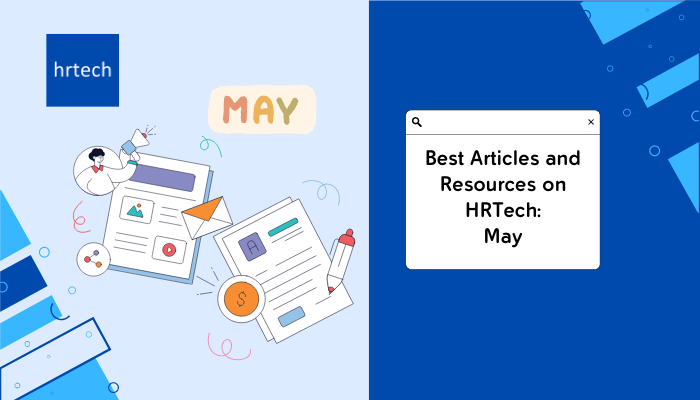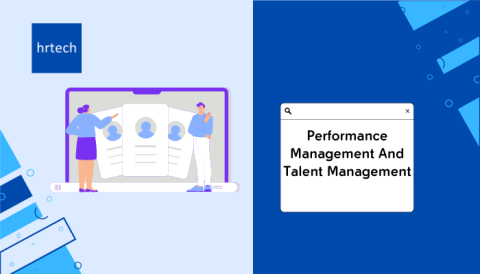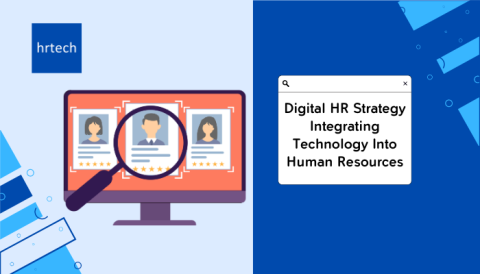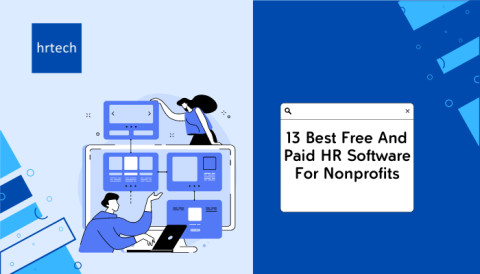Best Articles and Resources in #HRTech space in May 2020
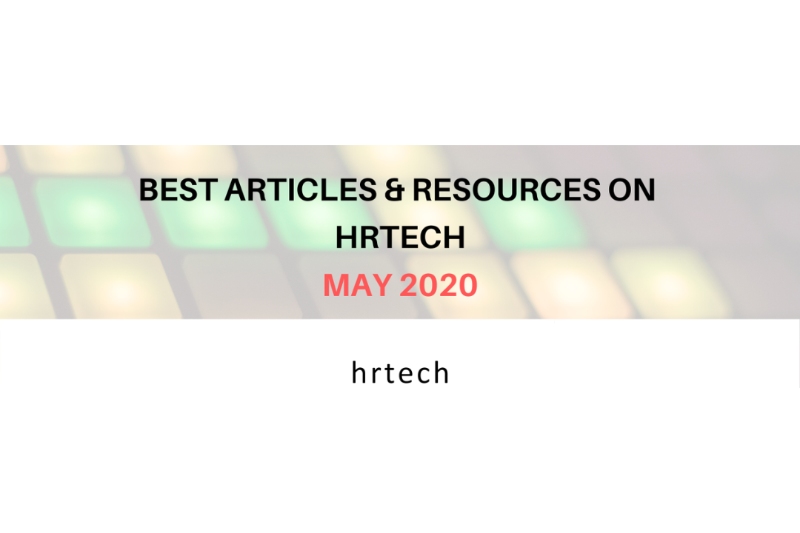
I. WEBINAR: The Big Reset In HR Tech
By JOSH BERSIN (Dean Josh Bersin Academy), HR Tech Fest Connect 2020-HRM Asia
A key highlight in the HRTech event segment was the HR Tech Fest Connect 2020 which was held virtually in May 2020. Global Industry Analyst Josh Bersin, in his keynote on Day 1 of the event, shed light on some of the biggest challenges that the HR industry is facing in the new world of work.
Source: Josh Bersin, https://joshbersin.com/
Emphasizing the need to communicate, empower and train HR teams he added that the biggest change in HR is turning from a Responsive (efficient) model to a Resilient (adaptive) function as it keeps pace with the rapidly changing world of work. Highlighting the trend where many businesses will turn to technology to transform and transition into a new way of working remotely, he believes that there will be a shift from HR Tech to Work Tech.
He explained that with the pandemic requiring HR and technology to things differently, HR tech market will need to adopt the address these changes starting an era of Work Tech, which adding features that used to be ‘nice to have’ such as photo sharing, chat functions and events etc.
As the work life boundaries blur with remote working being adopted widely across organisations, Bersin sees HR technology market to grow around well-being, employee experience and learning. He also advised HR professional to get involved in the decisions of selecting tools of implementing big initiatives such as work-from-home arrangements, because it will have a great impact the way people interact and work.
Read HRM Asia’s full coverage on the webinar here.
II. WEBINAR: The New “Now Of Work”
By JASON AVERBOOK (CEO and co-founder of Leapgen), HR Tech Fest Connect 2020-HRM Asia
With lockdowns gradually being lifted around the world, organisations have decisions to make. While there may not be a silver bullet for organisations it is indisputable that – work has changed forever, and organisations need to embrace the “Now of Work”, urged Jason Averbook, CEO and co-founder of Leapgen, sharing in his keynote address in Day 2 of HR Tech Fest Connect 2020.
As the ‘next normal’ comes into focus, and work being redefined weekly, organisations focus on navigating the future and eliminate processes that don’t add value “now”.
Averbook advised companies to begin with the adoption of digital models across the organizational structure.
He said, the digital workplace and a digital mindset is the new mandate for every organization in the world now. Urging HR professionals to play their part in this strategy he suggested to bring workforce together for facing digital efforts with changing focus from the now to next.
He emphasized that organisations need to initiate change and create a mindset to understand people and reimagine processes to ensure technology is a used as a bedrock to fuel these changes.
Averbook concluded that HR must shift from a silo-ed technology operating model to a coordinated digital model and shared his TEN guideposts for the Now of Work:
Source: Jason Averbook, Leapgen
Read HRM Asia’s full coverage on the webinar here.
III. WEBINAR: Are Your Exams Ready For The New Normal-Remote Online Learning?
By BRENDAN BELLEFEUILLE and RAJEEV MENON, Hosted By Talview
Like many other industries Covid-19 has made an impact on how the education sector where Universities all over the world are quickly transitioning from classroom setting to online learning, and though for some online learning systems were already in place the move to remote online exams has not been as smooth.
A HR Tech solution commonly used in this area is Online proctoring that presents itself as the best option to maintain test integrity and prevent cheating as more exams go online. Remote proctoring also has an inherent advantage of scale and scheduling flexibility along with reduced logistical issues for test-takers.
Industry experts Brendan Bellefeuille (Remote Proctoring expert) and Rajeev Menon (Chief Business Officer, Talview) discuss how universities can leverage online exams and remote proctoring technology in this on-demand webinar. They share an introduction and evolution of proctoring, the impact of COVID on online exams and some key considerations before switching to remote proctoring. The webinar also covers a demo of the Talview online proctoring solution.
Watch the on-demand webinar here.
IV. WEBINAR: The Future Of Work After Covid-19: HR Tech Trends
By CHIOU HAO CHAN (JustLogin) and SRIRAM IYER (hrtech.sg), Hosted by JustLogin
Even with the Circuit Breaker measures ending, the impact of COVID-19 is here to stay. According to a survey by global professional services firm Aon, human capital will be the focus of the new normal in the workplace. The human capital decisions businesses make will shape the future of work and their organisations. In this webinar, Chiou Hao Chan, COO of JustLogin and Sriram Iyer, CEO & Founder of hrtech.sg discussed new workplace trends and HR tech to help businesses adapt to the new normal.
Key trends and insights covered included:
- The future of work trends and the role of HR and business leaders to adapt to these trends
- Solutions SMEs can leverage on to adapt to the new work trends
- What are the key trends emerging from the pandemic at the workplace from a HR Tech perspective?
- What features can HR Tech players integrate to support the growing trends of remote working?
- How can HR Technology and Tools can solve collaboration, engagement, and productivity challenges?
- Key reasons that HR Teams should keep in mind while implementing a HR Tech program.
Access the on- demand webinar here.
V. PODCAST: Culture First, HR Tech Second
Ft. SRIRAM IYER (CEO and Founder, hrtech.sg), Hosted by PeopleHum
The inherent cultural element of a company really plays a major part in the success of an HR transformation journey or in the success of the implementation of an HR technology product. A key element of the entire journey is a strong change management plan that should be incorporated in the road map. If you look at most implementations that we have seen, the change management aspect is not given enough importance by HR teams, leading to the failure of implementations. That clearly shows that culture is an integral aspect for any HRTech solution implementation.
For the complete podcast, click here.
VI. BLOG: Delivering Digital HR For The ‘New Normal’
By HERMAN ROLFERS (Director Global HR Technology & Solutions, The HEINEKEN Company)
COVID-19 has profound impact on the way we live and work accelerating the Digital HR transformation. However, the crisis has reinforced the importance of digital transformation and it is likely to accelerate its pace further as businesses adjust to the ‘new normal’. Businesses will need to mobilize their people and ensure they have the right talent in the right roles to ensure long-term business success. Staying on course with key priorities, staying focused on your employees and understanding the implications of the ‘new normal’ will all be key to the long-term health of an organization. The crisis has shown that agility and adaptability are key components to a business’s survival right now. The digital tools they are using to work successfully might not be the same we had in the business plan. Bringing these learnings back into our business when we return could be of great benefit. These approaches will make the difference of whether an organization’s HR digital transformation simply survives or thrives in the new post-COVID-19 world.
Read the full blog here.
VII. BLOG: How Is The Pandemic Changing Investments In HR Tech?
It’s abundantly clear that COVID-19’s impact on HR software customers, vendors and consulting firms has been unprecedented. Following a new study from Raven Intel, that impact translates into disruption and massive change not only on current projects, but also future HR-technology investments. The study was conducted on people representing a variety of job functions within the HR information and technology management across a range of business sectors and industries. In terms of duration, 38% say the impact on current projects will last six months or more, while 21% are proceeding as expected and 15% are accelerating changes. Interestingly, about 64% say remote work has made HR project work more productive.
Researchers believe that investments in technology that makes it easier for people to work from home will continue to increase though the investments may slow down initially. Most of the investment will be in the form of collaboration and productivity solutions and there is a need for a strong case needs to be made to invest in solutions that improve employee experience and ensure wellbeing while working remotely.
Mercer believes HR has been at the helm through this pandemic and the C-Suite has developed trust and reliance on HR for direction to navigate these rough waters. It is also likely that post Covid-19, the demand to manage a virtual workforce will increase and HR will continue to improve HR technologies to further enable online learning and career development, feedback and engagement, hiring and onboarding and many other key functions.
Read the full article here.
VIII. BLOG: Addressing Artificial Intelligence-Based Hiring Concerns
By DAVE ZIELINSKI, SHRM Blog
Use of Artificial intelligence(AI) tools has certainly been a trend that has been embraced by HR practitioners seeking to use machine-learning algorithms to bring new efficiencies to recruiting, employee engagement, performance management, shared services, learning and development, and other areas of HR.
As the use AI has grown, it has uncovered concerns about fairness, ethical use well as potential bias that is tied to technology. This increasing scrutiny has manifested itself in a flurry of legislation and regulatory actions designed to create greater oversight of the use of AI in human resources.
Lack of transparency in the way that many AI vendors’ tools work can intensify unconscious bias in hiring decisions.
Recruiting experts, academic researchers and AI vendors interviewed for this article offered ideas on how providers of artificial intelligence tools can help mitigate potential bias in their algorithms. Key insights include:
- Take technology-based cues. Ben Eubanks, principal analyst of Lighthouse Research, an HR research and advisory firm, says the use of technology-based “nudges” to help promote balanced decision-making by recruiting teams
- Scrutinize the data. Frida Polli, CEO of assessment provider Pymetrics, says one reason Pymetrics is able to “de-bias” its AI-driven assessment models is because the traits the models measure—things such as memory and risk taking—are more evenly distributed across the human population.
- Create diverse development teams. Eyal Grayevsky, CEO of AI platform provider Mya Systems, says hiring a diverse engineering and product development team, training it on unconscious bias, and ensuring that product design decisions are made to consciously reduce bias are important steps to ensure that algorithms remain bias-free.
Read the full blog here.
IX. RESEARCH: People Analytics Technology: Rising To The Occasion
By STACIA GARR, PRIYANKA MEHROTRA, RedThread Research
Over the past two months, People Analytics community has come together rapidly to support organizations as they navigate their way through the COVID-19 crisis. This RedThread research consolidates vendors and the resources they offer based on their 2×2 people analytics technology framework which includes like Employee Coaching, Employee Engagement/Experience, Multi-Source Analysis Platforms, Organizational Network Analysis, Learning Analytics, Text Analytics, and Labor Market Analysis.
Source: People Analytics Technology Landscape, Redthread’s market map of 37 People Analytics vendors (https://redthreadresearch.com/2020/01/30/pat-tool/ )
The HR Technology providers are beginning to support “return to workplace” efforts through surveys and insights to measure the level of readiness and sentiment of the workforce; whereas, consulting providers are creating support kits and helping customers think through their new strategies like compensation planning, shift planning, and attrition and retirement.
As more and more areas recover from the pandemic, people analytics technology will move from being used to help organizations react and respond to plan for and adjust to the new normal. This will affect and bring about a significant shift in the thinking and how organizations approach work moving forward. With vendor community rising in this time of need, People analytics is well positioned to not just support but take a lead in helping businesses achieve these objectives.
For detailed analysis of each category, read the Redthread research here.
X. RESEARCH: APAC’s State Of HR Transformation Study 2020 By Alight Solutions & People Matters
By SHASHWAT KUMAR, VIKRANT KHANNA (Alight solutions) and ESTER MARTINEZ(People Matters)
APAC’s State of HR Transformation study 2020, by Alight solutions and People Matters, in its third edition focuses on the theme ‘Adaptable HR’ as it is becoming imperative for organisations to be more adaptable as workplaces across the globe are undergoing a dramatic transformation. The recent crisis has made it critical that HR teams accelerate the change of their HR Service Delivery Model and drive the shift needed in organisations to adapt to this new business model.
The State of HR Transformation Study explores the anchors of adaptability in the HR functions. From the importance of the HR operating models to behaviors that the HR team needs to display, the report details key action steps to improve HR governance and effectiveness.
Enablers to Successful HR Transformation
The study finds that mature organisations, with a combination of HR Operating Model and complementing HR Technology Strategy, are more confident in their ability to adapt. With maturity, the focus shifts towards linking HR data/ insights with business performance. This shift creates new demands on capability and ways of working within HR itself and also between HR and business. The study emphasizes that resistance to change from HR is the biggest barrier in realizing transformation, and the ability see the transformation journey as a logical, disciplined, and executable manner is the art of becoming adaptable. The study reminds us that HR Transformation is not a project, it is an ongoing journey across Planning, Execution and Realization stages.
Read the detailed study here.
XI. CASE STUDY: Skillsfuture Singapore Employs Technology To Improve HR Processes And Employee Experience
By Ms TRACY LEE, Director of HRD, SkillsFuture Singapore
SkillsFuture Singapore(SSG), one of the organisations in APAC, has been reaping benefits of implementing HR Tech solutions to elevate their HR capabilities by enhancing their HR processes, enabling their HR department to utilize their freed-up time in strategic relationships and resulted in high performing teams. The HR Tech areas where they implemented solutions include video interviewing, skills profiling, mobile learning and use of blockchain for verification.
Use of video interviewing tools has saved time in scheduling and conducting interviews, provided flexibility to interview panel during reviews, and improved the comparability among candidates amongst other benefits. With skill profiling tools, SSG were able to build a skills inventory of their employees and identify prevalent and unique skills among their staff. The tool enabled them to ascertain the skill gaps by comparing with the job market demands and shaped their strategies towards skills development and acquisition. To help staff upgrade themselves, mobile learning was introduced. This shortened the learning curve for new employees, provided an option to learn on the go, and validate their knowledge with quizzes. SSG also launched OpenCerts, a blockchain based platform that provides a reliable way to issue and verify authenticity of learning certificated and qualifications which enable employers to accurately verify the candidates’ certificates reducing administrative costs and improving efficiency of the process. These initiatives have increased HR’s effectiveness as learning champions.
For a detailed read, click here.
About the author :

Swechha Mohapatra (IHRP-CP, Associate CIPD) is a Senior Consultant – Digital HR at hrtech.sg and has over 7 years of global experience in various Talent functions. She is a passionate HRTech evangelist and an avid learner who is certified Six Sigma-Green Belt with a background of MBA (Specialization in HR and IT) and Master’s in Labor Laws and Labor Welfare.
